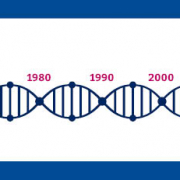AI can improve DNA analysis, eliminating need for additional test
Artificial intelligence (AI), when applied to exome sequencing data, may help to detect disease-causing copy number variants, say Cambridge-based researchers
Genomic testing has shortened the diagnostic odyssey for many children with rare diseases or developmental disorders and research shows that it may be possible to reduce the number of tests even further. A study published in Genetics in Medicine Open demonstrated how a single genomic test, supported by a type of AI called machine learning, could replace two separate stages of testing. This would help speed up diagnosis and reduce NHS costs without compromising testing accuracy.
Testing via exome sequencing
Whole exome sequencing (WES) – the main technology looked at in the study – is a type of genomic sequencing that looks at protein encoding genes, which make up less than 2% of the human genome. WES is already used to look for small genomic changes in children who have developmental disorders or suspected rare diseases. It has many advantages: it’s cheaper and it produces more manageable datasets than whole genome sequencing. Also, it remains quite a powerful tool in uncovering the genomic basis of disease, particularly when testing in a ‘trio’ – meaning when children are tested alongside their parents.
Historically WES has not been considered suitable for detecting larger variants, such as copy number variants (CNVs), due to data generation and analysis processes. In addition, for all results from WES data to be accurate, its processing requires heavy support from specialist bioinformaticians who know how to work with it to produce clinically useable results. Instead, a different kind of technology, called a microarray, is currently used.
- GeNotes: Whole exome sequencing
- Blog: The power of three: The importance of trios in diagnosing disease
CNVs as medically significant genetic variants
Often, genetic variants give no cause for concern, but sometimes they can cause genetic conditions or developmental delay. CNVs, for example, have been associated with neurodevelopmental disorders including Angelman, DiGeorge and Williams syndromes. These types of genomic variants often arise ‘de novo’, meaning they arise for the first time in an individual rather than being inherited. It is estimated that they cause 3%–14% of rare developmental disorders in children.
Researchers now wish to improve data processing from WES so that it can be considered a viable testing method in these instances.
- Blog: What are copy number variants?
- Learning resource: Genomics in Neurology
What did researchers find?
To try and increase the accuracy of detecting CNVs in exome sequencing data, the researchers used machine learning – a field of AI that looks for patterns across data – to integrate results from four different exome-based algorithms. The combined result was far more accurate in spotting CNVs than any of the original algorithms alone. They then tested this approach on data from almost 10,000 families who took part in the Deciphering Developmental Disorders study and compared the results to those generated by microarray testing. In terms of accuracy, the exome sequencing results were equivalent to or better than those from the microarrays.
The paper’s authors concluded that, via this test, scientists could enable a diagnosis in families who might otherwise go undiagnosed. They also suggested that additional improvements to the test’s accuracy could be possible, but said that support from skilled bioinformatics would be required before this approach could be rolled out widely. Wellcome Sanger Institute’s directory and study author Professor Matthew Hurles said: “We are still learning how large-scale genetic variations impact human health. This study proves that with the right computational methods, a single test can accurately detect them.”
“Under the current system, children often endure a lengthy, step-wise process of different genetic tests before reaching a diagnosis”, added Cambridge University Hospitals NHS Trust consultant clinical geneticist and the lead clinician on the study Professor Helen Firth, “This research brings hope that, in the near future, families might only need one.”
To learn more about rare disease, take a look at our rare disease education hub, and find out how genomics is helping more families achieve diagnosis.









